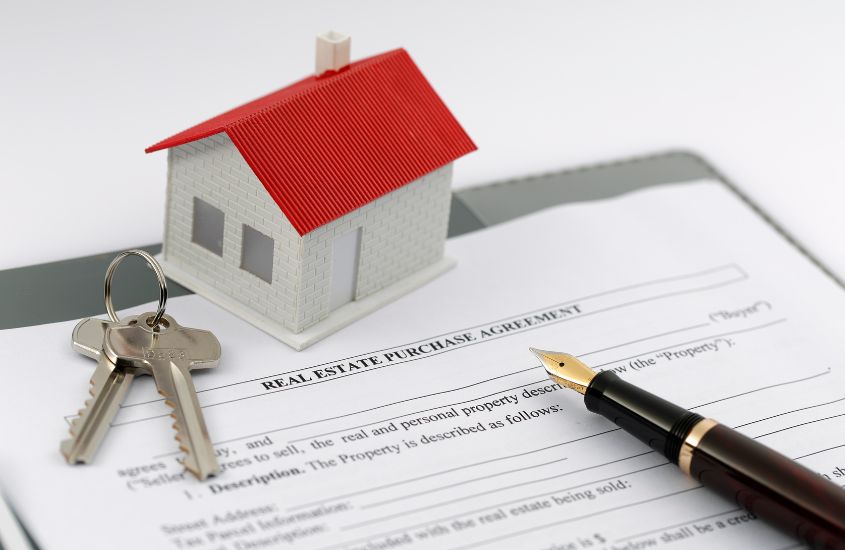Property Deed in Portugal: Understanding the Process and Key Considerations
When purchasing real estate in Portugal, the property deed is one of the most important legal documents. It confirms the legal ownership of the property and outlines the rights and responsibilities of the buyer. The process of obtaining a property deed in Portugal is straightforward but requires careful attention to detail. In this blog, we will explore the key aspects of a property deed in Portugal, including the legal process, essential documentation, and why this document is crucial for any real estate transaction in the country.

Legal Framework Governing Property Deeds in Portugal
Portugal’s legal system offers robust protections for property buyers, ensuring that the transaction is transparent and legally binding. The process of obtaining a property deed in Portugal is governed by several laws, including the Portuguese Civil Code. This code outlines the procedures for buying and selling property, ensuring both the buyer and seller are protected. The property deed must be signed in the presence of a notary to make it legally binding. Without this notarization, the deed cannot be registered, and the buyer won’t be recognized as the legal owner.
The Importance of a Property Deed in Portugal
The property deed in Portugal is more than just a piece of paper; it is the legal proof that you own the property. Without it, your rights to the property may be challenged, and you could face legal issues in the future. Whether you are buying a home, a commercial property, or a plot of land, having a properly executed property deed ensures that you have full legal ownership. It also provides peace of mind, knowing that all aspects of the purchase have been completed in accordance with Portuguese law.
Steps to Obtaining a Property Deed in Portugal
The process of obtaining a property deed in Portugal involves several important steps. First, both the buyer and the seller must agree on the terms of the sale, including the price and any conditions. Once the terms are agreed upon, a promissory contract is signed, which outlines the obligations of both parties. After this, the buyer must arrange for financing, if necessary, and perform due diligence on the property. Finally, the property deed is signed in the presence of a notary, who will ensure that the transaction is legally binding.
Essential Documentation for a Property Deed in Portugal
Several key documents are required to complete a property deed in Portugal. The buyer must provide proof of identity, such as a passport or national identification card. In addition, a fiscal number (Número de Contribuinte) is required for both the buyer and the seller. The property must be fully registered with the Land Registry (Registo Predial), and a certificate proving this registration must be provided. The seller must also provide an energy performance certificate, confirming that the property meets the required energy efficiency standards.
Costs Involved in Registering a Property Deed in Portugal
Registering a property deed in Portugal involves several costs that buyers should be aware of. These include notary fees, registration fees, and taxes. The buyer is responsible for paying the Municipal Property Transfer Tax (IMT), which is calculated based on the value of the property. In addition, a stamp duty of 0.8% of the property’s value must be paid. Notary fees can vary depending on the complexity of the transaction, but it is important to budget for these costs when planning to purchase property in Portugal.
Role of a Notary in the Property Deed Process
The notary plays a crucial role in the property deed process in Portugal. A notary is a public official who is responsible for ensuring that the transaction is legally binding and complies with Portuguese law. They will verify the identities of both parties, review the terms of the contract, and ensure that all required documents are in order. The notary also oversees the signing of the property deed and registers the transaction with the Land Registry. Without a notary, the property transfer cannot be legally completed.
Common Pitfalls to Avoid When Handling a Property Deed in Portugal
There are several common pitfalls that buyers should be aware of when handling a property deed in Portugal. One of the most common mistakes is failing to perform due diligence on the property. It is essential to ensure that the property is free from legal disputes, encumbrances, or outstanding debts. Another pitfall is not budgeting for the additional costs associated with the purchase, such as taxes and notary fees. Buyers should also ensure that the property is fully registered with the Land Registry to avoid future legal issues.
Benefits of Working with a Legal Professional for Your Property Deed in Portugal
Given the complexity of the legal process, it is highly recommended to work with a legal professional when handling your property deed in Portugal. A qualified lawyer can assist with reviewing the contract, performing due diligence on the property, and ensuring that all legal requirements are met. They can also represent your interests during negotiations and help resolve any disputes that may arise. Working with a legal professional provides peace of mind and ensures that the transaction proceeds smoothly.
Conclusion: Securing Your Property Deed in Portugal
Obtaining a property deed in Portugal is an essential step in any real estate transaction. It provides legal proof of ownership and protects your rights as a property owner. While the process is relatively straightforward, it is important to pay attention to the details and ensure that all legal requirements are met. By working with a notary and legal professional, you can avoid common pitfalls and ensure that the transaction is completed successfully. Whether you are buying a home or an investment property, securing a property deed in Portugal is key to protecting your investment and enjoying your new property with confidence.

